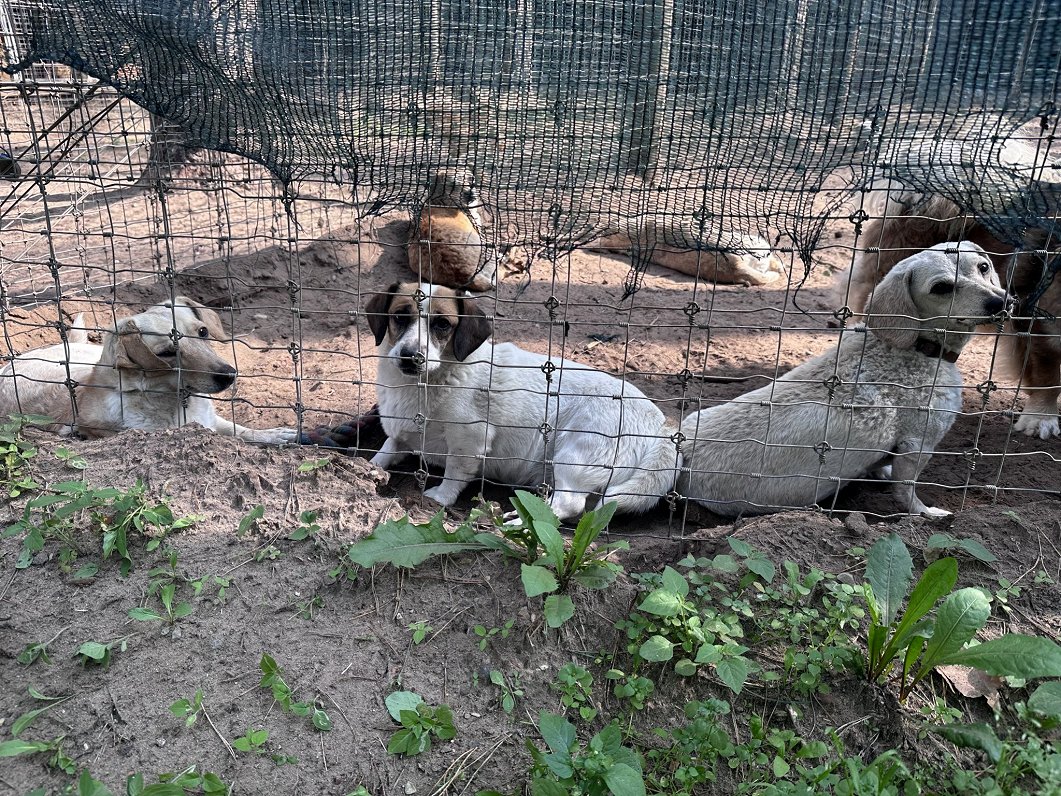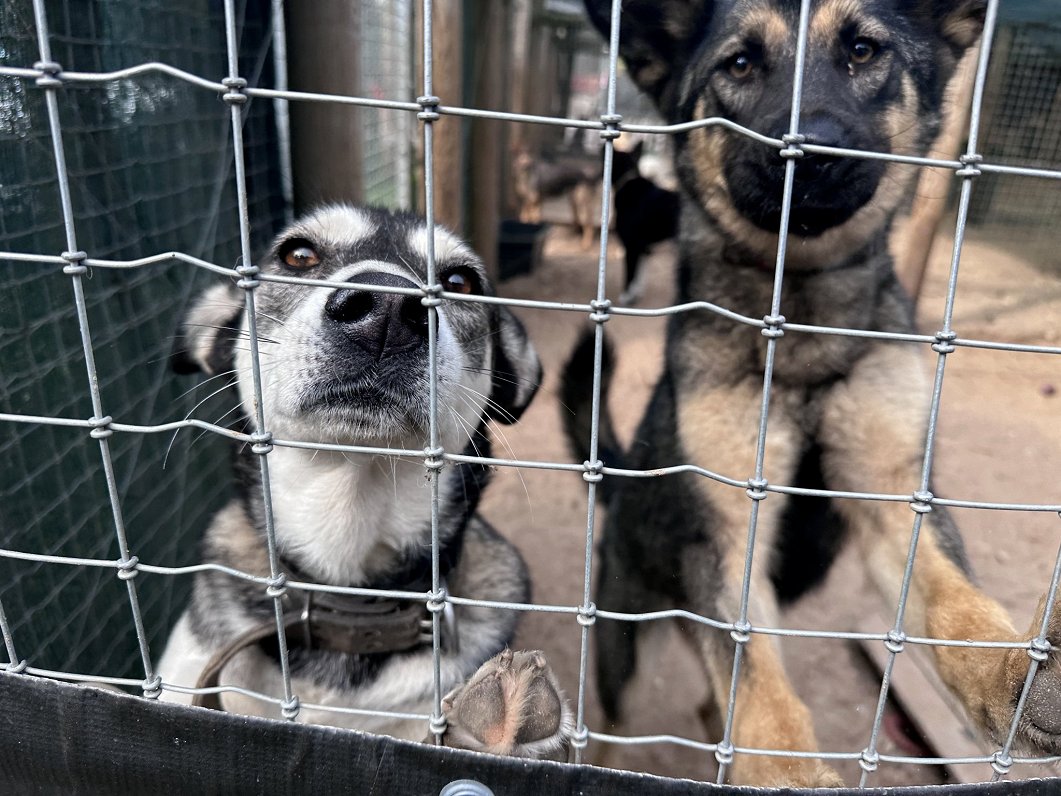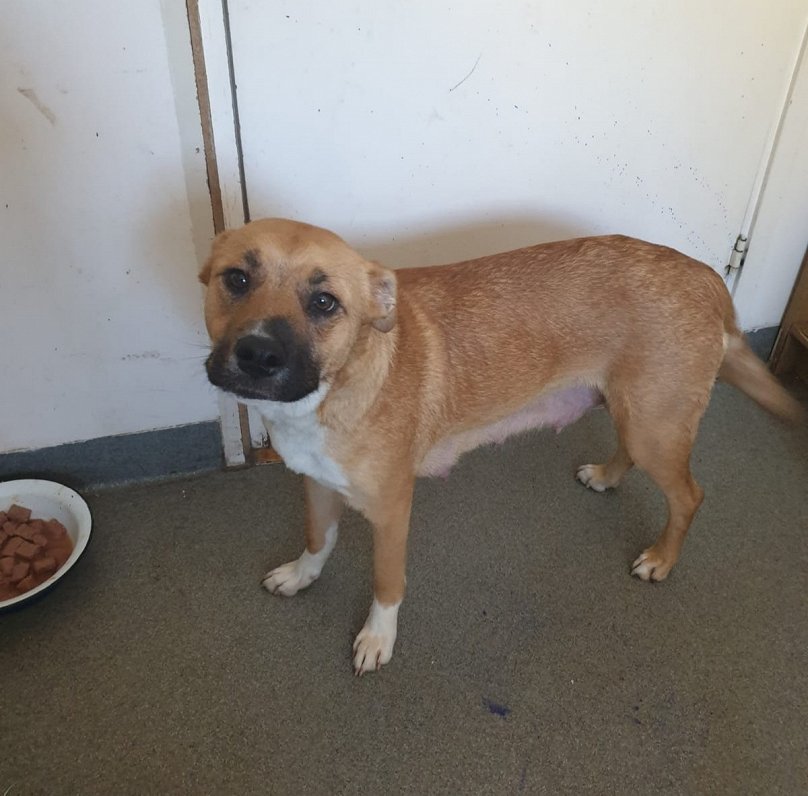Last year, half of the money donated went to the animals themselves and to the maintenance of the shelter. The shelter claims that it carefully evaluates future owners and does not allow animals to be taken by people who provide worse conditions than can be found in the shelter. According to Latvian Radio's latest 'Atvērtie Faili' (Open Files) investigation however, things may not be as they seem – dogs may even be given to people without homes themselves.
The homeless man
It is a sunny August afternoon. In the underground pedestrian tunnel near the Riga Central Railway Station, Latvian Radio meets Angela Naturina. Latvian Radio and Angela are looking for a man known as 'Vladimir' in the tunnel. He is homeless and used to be seen begging here. "He sat here, it was his place. In the afternoon he was always here," says Angela.
Vladimir had several dogs. They usually slept on a piece of cardboard or blanket next to the owner while the man asked passers-by for money. Angela noticed the pets and started bringing them dog food regularly. "He was usually with an old dog. And then I saw him with a new dog and thought – it's strange that a homeless person has a new dog," says Angela.
Vladimir told Angela that he found the puppy in a garbage can and named her Gerda. "After some time, I went there again and saw that the dog was obviously pregnant, expecting puppies."
Angela was surprised by this. She had previously offered to pay for the sterilization of the dog, but Vladimir refused, saying the dog had already been sterilized. "I asked, what are you going to do with the puppies? He said – I don't know, I will give them to someone! I asked – where do you live? Then he said that he lives in the small garden allotments of Lucavsala [a small and partially run-down island in the River Daugava]."
Angela offered to take the dog to the vet so that the birth could be monitored and the puppies have a safe haven. "I called my friend, I said - Sasha, will you go with me? I don't know where that homeless man lives, I'm somehow afraid to go there alone."
Both women managed to find Vladimir's home in the small vegetable patches of Lucavsala. "It was small, literally like a cardboard, veneer house, made of some kind of boards. There were two drunk men and two dogs who can attack each other at any moment, really very little space – two or three meters."
Angela agreed with Vladimir that she would take the pregnant dog to the shelter and that when the puppies no longer needed their mother's milk, she would return the sterilized dog to him. Just two days later, under the supervision of a veterinarian, eight puppies were born to Gerda at the "Mežavairogi" animal shelter in Ķekava parish.
The gas station
"When I went to Mežavairogi, the administration checked the dog's electronic chip. It turned out that the registration in Vladimir's name was done by Ulubele," says Angela.
Ulubele animal shelter is located in Stopiņi parish and is the largest animal shelter in Latvia. It had previously given the dog to the homeless Vladimir. The chip also contains the dog's registered address. When checked, it turned out to be not a private address but a gas station at the foot of the Salu Bridge in Rīga, close to Lucavsala.

The animal-loving Angela received an unpleasant surprise a month later. "After that I was invited to the police. It turned out that he [Vladimir] filed a complaint with the police that I stole his dog and that I have to pay him 600 euros for each puppy," says Angela.
According to her, it was not Vladimir who wrote the application addressed to the police on several pages of A4 format. Danuta Priede, head of the "Mežavairogi" animal shelter, who was also questioned by the police, has similar thoughts.
"He was brought to us at the shelter by a lady who appeared as his lawyer, a Mrs. Rumjantseva, as we found out later," says Danuta Priede, head of the "Mežavairogi" animal shelter.
Jelena Rumjantseva, who came to "Mežavairogos" together with the homeless man and submitted the man's application, has publicly called herself a volunteer for Ulubele, Latvian Radio said.
"I was really surprised by how much interest there is in this man getting his dog back without being able to support it – he has no place to live, he's begging in a tunnel, and it seems normal that he has to return a dog with eight puppies. Any normal person there, a reasonable person understands, thank God, that animal is no longer there and normal care is provided for it," says Priede.
In Vladimir's submission to "Mežavairogi" it is written that he thought that his dog Gerda was at Ulubele. However, he later found out that the dog was elsewhere. In the document, he asks for the return of his property – nine dogs – and claims the incident is a fraud.
Priede heard something else from Vladimir himself. "He said he didn't want the puppies. But I say — you understand what your lawyer wrote in that document? He says — I don't know what she wrote there. I just signed."
"He told me that yes, a person from Ulubele drives him, a woman who helps him feed his dog, who brings him food and takes care of him like half of that animal."
The animal shelter
The Ulubele shelter has signed a contract with Riga City Council for catching and housing stray and homeless dogs. Priede admits that if the puppies had been born in the gardens of Lucavsala near Vladimir, they would quickly end up in this shelter. "I don't know how much it would cost the Riga City Council to catch eight puppies in the gardens of Lucavsala. I assume that it would be thousands, because at that time, if I'm not mistaken, puppies were kept until they were three months old."
This amount is so large because the municipality pays for 56 days in the shelter for puppies. For adult dogs only 14 days are paid for.
When Gerda's puppies had grown, the "Mežavairogi" shelter found them a home. Gerda was already sterilized and given to Vladimir in Lucavsala. "We understand that legally this dog belonged to this person. We understand that, and we do not have the right to remove it just because we like it," admits Priede, head of the "Mežavairogi" shelter. Gerda was back in Ulubele a year ago and was quickly adopted. She currently lives in Saulkrasti.

Ulubele shelter in Stopiņi is managed by Ilze Džonsone. Undoubtedly it does a lot of good work. "We have a lot of animals, now there are never less than 500 on site every day," says Džonsone.
The shelter could accommodate about a hundred more, but then the animals would be crowded. "This is our main building, here is the happy room where animal adoptions take place, as well as the veterinary clinic," says the manager of Ulubele.
The shelter does not put animals to sleep. Džonsone says that Ulubele carefully evaluates the adopters, because the shelter feels responsible for each animal. "We're trying, we're trying. We have... I'll show you later, we have forms that the adoptive parent fills out, then we have discussions with them."
People who wish to adopt should be able to provide equal or better housing conditions than the shelter itself. "We don't want to put animals in worse conditions than they have here," Džonsone said.
When asked about the homeless Vladimir and his dog Gerda, Džonsone says that the dog came to the shelter because she was caught straying. "Well, if it's the owner's dog and the owner shows up within 14 days, we don't judge him by his financial status, whether he's a millionaire or a poor person. The animal is returned with a chip, registered, but all responsibilities – whether to sterilize the animal or whatever – are up to the owner. "
However, Gerda's microchip information shows that the dog stayed in Ulubele for more than 14 days. Therefore, according to the law, the dog had to find a new owner. Why did the shelter instead give the dog to the homeless and register the animal at a gas station?
"Well, you know, the address given by the owner of the animal, we also record it as the place of keeping," explains the manager of the shelter.
When Latvian Radio managed to talk to Vladimir in the pedestrian tunnel, he said that Ulubele brought food to his dogs in the gardens of Lucavsala. Džonsone says that the food delivery is a gesture of help.
"Very often, if the needy come into our sight, well, usually they are people who help take care of cat colonies, we help, yes, with food," notes Džonsone.
Several municipalities have contracts with companies for catching stray animals, including the Ulubele-linked Dzīvnieku policija (Animal Police) and Zoopolicija (Zoopolice). Therefore, dogs and cats are not only accepted in the Ulubele shelter, but also delivered by these companies.
"In principle, we serve the municipalities of Pierīga, Rīga, Ropaži, Sigulda, Salaspils. On the one hand, it is very difficult, but on the other hand, although the municipalities only pay a small amount for 14 days, it is still some kind of regular income," says the head of the shelter.
Cooperation between Riga City Council and Ulubele started more than ten years ago. Between 2014 and 2022, the association received significant money from the municipality – almost one million euros.
Two years ago, the Center for Combating Bureaucracy of the Riga City Council published a report in which it revealed a series of shortcomings and lack of control in the municipality's settlements with Ulubele. When asked what was checked, Aigars Evardsons, the senior expert of the Center, said at the time: "It is precisely about the accounting of animals - how the catching, accommodation and care of stray homeless, helpless animals is organized."
According to the report, the municipality suspected that unregistered dogs were in the shelter. In this way, Ulubele was potentially trying to significantly increase the number of animals whose maintenance is paid for by the Riga City Council.
"The contract stipulates that monthly transactions for the service performed are based on the reports submitted by the service provider. Thus, it is impossible to control what we actually pay for in the municipality," explained Evardsons.
The council had also paid for the maintenance of puppies in Ulubele for a long time, although the animals were not in a shelter, but in temporary homes. This means that the animals were cared for by people unrelated to Ulubele. "As part of this inspection, we also turned to the Agricultural Data Center, which specifically lists and registers animals. In this case, it's about dogs," said Evardsons.
It turned out that the shelter housed dogs that were not registered with the Agricultural Data Center. Džonsone rejected the accusations at the time. "At that time, the regulations did not require it, and it was an interpretation of the regulations. We had very long discussions with the Food and Veterinary Service about it. Once upon a time, the only criterion was that an unregistered dog could not be released from the shelter, and we fulfilled this in good faith," she says.
The responsible official lost his job in the City Council and with the amendments to the regulatory acts, shelters were no longer allowed to keep animals not registered in the Agricultural Data Center. In order to monitor the settlement process, a strict control system was introduced in the municipality.
Since the introduction of the new control system, the number of dogs admitted to the shelter has decreased by a third. But the amount that "Ulubele" receives from the Riga City Council has halved.
The billionaire donor
Questions about the work of the shelter, which are related to funding and its use, are not only raised by the association's cooperation with the capital's municipality, reported Latvian Radio. Ulubele also receives money from donors. In recent years, more and more people donate to the shelter. Last year donations were more than 580,000 euros. However, only half of that amount went to the animals and the maintenance of the shelter.
Since 2015, one of Ulubele's most generous donors has been a foreigner: Israeli-Canadian businessman, Mark Igal Scheinberg. In the last eight years, he has donated nearly a million euros. According to Forbes magazine, Scheinberg is a billionaire who made his fortune in the online gambling business, and now has an international property empire. The "Paradise papers" leaked from the legal firm "Appleby" reveal that his businesses are also closely connected with the low tax zone of the Isle of Man, where he officially resides, according to the Financial Post.
In the last two years, "Ulubele" has spent much of the donated money on legal services. Last year it was 160,000 euros according the annual reports of Ulubele. The total revenue of Ulubele last year was 797,262 euros, while expenses were 771,846 euros.
Previously, the only law firm that offered services and was previously listed on the shelter's website is owned by Džonsone's spouse, Aivars Borovkovs. The company register information also reveals that Ulubele regularly hands on part of the donation money to its foundation 'Animal Police' ('Dzīvnieku policija'). Both Džonsone and Borovkovs are on its board. In the past few years, this association has received more than 200,000 euros from Ulubele.
However, in the Animal Police reports, this money does not appear as a donation, but as income. Therefore, the association does not have to publicly report on their use.
When asked how the shelter copes with money matters, Johnson says: "Well, we try to break even, but it's a very, very difficult mission, because something always breaks. If you've been able to do something, it's thanks to donations... We need help around the clock," says Džonsone.
She says that she also does not discriminate between donors based on how they earn their income.
"We don't limit donors in any way and we don't turn away any help because we just can't afford it. And I believe that anyone — whether it's a cigarette dealer, a payday loan, an alcohol dealer, whatever, or a gambling operator — if these businesses are legal in Latvia, then we have no reason to refuse help!" She did not comment on why Mark Scheinberg is such a particularly generous donor.
The flow of money both to and from Ulubele, as well as the fact that the use of money cannot be easily traced, prompted Latvian Radio to seek the opinion of the "Delna" transparency NGO . Its lawyer Krista Asmusa stated: "It is clear that if on one side those funds are transferred as a donation and at the same time they are accepted in a different way, then it certainly raises further questions."
Asked about the shelter's spending on legal services, Asmus said, "It seems disproportionate, given that it's an animal welfare organization, I really personally don't understand how one-third of the income can be devoted to legal services."

According to her, donors should know how the organization spends their money. "Are those people who donate to Ulubele aware that the funds go to another foundation, not to Ulubele?"
How does the main institution in the country responsible for animal welfare – the Ministry of Agriculture (ZM) – assess the situation with regard to donations to Ulubele? Agija Mediņa, head of its Animal Trade, Welfare and Feed Department, says: "People should evaluate the so-called advertisements of each shelter – I will call it a gimmick or advertisement – where they ask for a donation for each animal."
According to her, this practice also exists in other countries, because shelters have different funding models. "Each case must be evaluated individually, because the suffering of animals can very well affect society. As soon as we want to donate money to something, we must understand who we are donating to and for what purpose it will be used."
Angela Naturina, who rescued Gerda and her eight puppies, believes that both shelters and institutions must ensure that animals end up with caring owners.
"It matters what hands the dog goes into," says Angela. In her opinion, it should not be allowed that dogs are deliberately handed over to homeless people. And it should also be more strictly controlled. "Just a question – how can it be checked? Where is the function, where is the authority to verify it?"




























